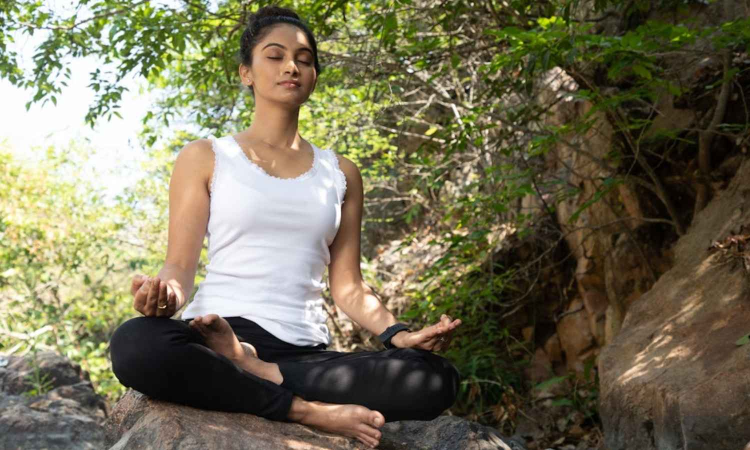Want to sleep better? These 3 breathing techniques from yoga can help
According to Akash Ram, a hatha yoga teacher from Isha Foundation, the secret lies not in chasing sleep, but in rewiring how we rest – which starts with the breath, the body, and the invisible energy that powers both.

A person demonstrating a breathing technique (Photo: Pexels)
HENNAI: How often do we find ourselves tossing and turning restlessly, our mind racing against the silence of the quiet hours of the night? Enervating professionals have their minds buzzing with unfinished tasks while staring at the ceiling at 2 am. New mothers are counting sheeps for the fourth hour, their sleep fractured by anxiety.
In our always-on world, stress often lingers past bedtime, polluting our quality of sleep. But what if the solution to this isn't another sleep tracker or a melatonin gummy, rather in the ancient wisdom of breath and movement?
According to Akash Ram, a hatha yoga teacher from Isha Foundation, the secret lies not in chasing sleep, but in rewiring how we rest – which starts with the breath, the body, and the invisible energy that powers both. He shared profound insights into the connection between yogic practices and restful sleep.
Akash began by clarifying a common misconception – yoga is not just about physical postures (asanas) or targeted therapy for specific ailments. Instead, it works holistically on the energy system (pranamaya kosha) within us.
“In yoga, we don’t just address the physical body or the mind. We work on the bodily energies which fuels both. When energy flows freely without blockages, the body and mind naturally find balance, leading to better health, including improved sleep.”
He goes on to compare the human system to hardware (body), software (mind), and an energy source (prana). “Yogic practices clear energy blocks, allowing the body’s innate intelligence to heal itself.”
Sleep, as Akash emphasises, is just one form of rest. Yoga cultivates a state of relaxation even while awake, reducing the need for excessive sleep. “When you practice yoga, your resting heart rate and breath rate drop. You remain relaxed even in activity, so sleep becomes deeper and more efficient.” He stresses that asanas are part of a complete system, and not isolated fixes.
As Sadhguru says, “The way you breathe is the way you think. The way you think is the way you breathe.”
Here are 3powerful pranayama (breathing) techniques that directly impact sleep quality.
Nadi shuddhi (Alternate nostril breathing)
Nadi shuddhi (Photo: Isha Foundation)
The nadi shuddhi pranayama involves breathing through one nostril at a time while holding the other nostril closed. This balances the ida (left/moon) and pingala (right/sun) energy channels.
The breathing technique purifies the 72,000 nadis (energy pathways), promoting mental clarity and relaxation. Practicing it the correct way, it will repair the system for deeper meditation by activating the central channel (sushumna).
Bhastrika (Bellows breath)
Bhastrika (Photo: Isha Foundation)
The bellows breath is a slow and soothing inhalation and exhalation technique, which reduces breaths per minute, activating the parasympathetic (rest-and-digest) mode. It also helps in the purification of blood, increasing lung capacity and relaxing the whole system.
Simha kriya (Lion’s breath technique)
Simha kriya (Photo: Isha Foundation)
The simha kriya pranayama was designed by Sadhguru during the COVID-19 pandemic. This helps with boosting immunity and lung strength. The powerful technique releases tension in the chest and throat, easing stress-related sleeplessness.
Akash narrates how yoga has transformed his own life. After starting as a practitioner back in 2017, he trained as a teacher at Isha in 2019. Beyond physical flexibility, he noticed improved organ function, hormonal balance, and nervous system regulation – all contributing to deeper, more restorative sleep. “Yoga isn’t just about sleeping more; it’s about needing less sleep because your body learns to rest even while awake.”
Beyond all the formal practice, he emphasises simple yet overlooked habits which adds to sleep deprivation.
-Reduce screen time before bed – One should stop using phones 1.5 hours before sleep.
-Move daily – Even non-yogic movement helps energy flow.
-Mindful eating – The fuel you put in your body matters.
“Sleep issues often stem from ignoring basic human needs like movement, clean fuel, and screen discipline. Yoga brings you back to these fundamentals. Yoga isn’t just a remedy; it’s a return to natural, effortless rest. It prepares you not just for better sleep, but for a life of vitality.”



